BRENT SCOWCROFT CENTER ON INTERNATIONAL SECURITY
Zapad 17: Implications for NATO and the United States
On Tuesday, July 11, in partnership with the Ministry of Defense of Estonia, the Scowcroft Center’s Transatlantic Security Initiative hosted a public event on “Zapad 17: Implications for NATO and the United States”, convening government representatives and security experts from across the United States and Europe. Among the select group of speakers were H.E. Kristjan Prikk, Undersecretary for Defense Policy, Ministry of Defense of Estonia; Marko Mihkelson, Chairman of the Foreign Relations Committee at the Parliament of Estonia; Maj Gen Finn Kristian Hannestad, Defense Attaché at the Embassy of Norway; and Evelyn N. Farkas, Former Deputy Assistant Secretary of Defense for Russia/Ukraine/Eurasia at the US Department of Defense and Senior Fellow at the Atlantic Council. The discussion revolved around Russia’s 2017 Zapad military exercise, its implications regional security, what it may reveal about Russian strategic thinking, and potential US and NATO responses.
The summer of 2017 is seeing a nearly unprecedented level of military activity in Northern Europe. In response to Russia’s increased assertiveness, NATO has stepped up its exercises in the Baltic Sea region – with, for example, the recently completed Saber Strike exercises and maritime exercise BALTOPS. In September, Russia is expected to launch its own major exercise, Zapad 17, to test the readiness and capabilities of its forces.
Zapad is a recurring exercise that involves Russian and Belarusian troops and takes place across Russia’s western military district, the Kaliningrad enclave and Belarus. Due to the size, nature, and possible ramifications of this exercise, Zapad 17 has been met with harsh criticism by Russia’s neighbors and NATO allies. Security analysts fear a shift in the regional military balance and an exacerbation in existing tensions.
The insights and highlights of the event will be captured in a two-pager and distributed for public consumption.
Cyber Risk Monday: The Darkening Web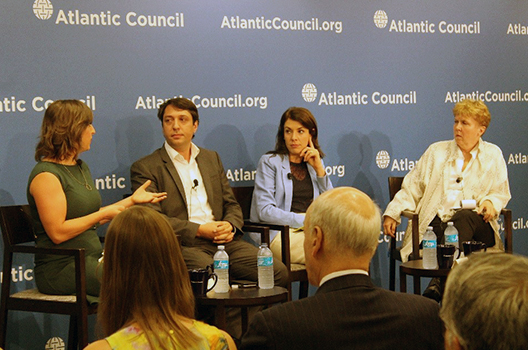
On Monday, July 17, the Atlantic Council’s Cyber Statecraft initiative, part of the Brent Scowcroft Center on International Security, held a moderated discussion.Ransomware attacks crippling hospitals; accusations of Russian interference in Western elections; reported US sabotage of North Korean missiles. No single invention of the last few decades has disrupted the nature of political conflict like the Internet, which is increasingly used as a weapon by actors eager to exploit or curtail global connectivity in order to further their interests. This Atlantic Council discussion brought together leading experts from the industry, government, and academia to discuss the chilling consequences the emergence of cyberspace as a new field of conflict has had on the global order.
The event celebrated the launch of Alexander Klimburg’s new book The Darkening Web: The War for Cyberspace.
See more about the Scowcroft Center
Back to Top
ADRIENNE ARSHT LATIN AMERICA CENTER
See more about the Adrienne Arsht Latin America Center
Back to Top
AFRICA CENTER
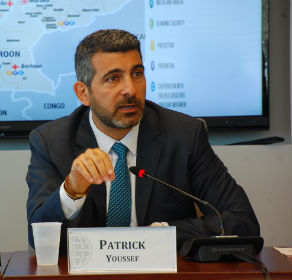
On Thursday, July 13, the Atlantic Council’s Africa Center, in collaboration with the International Committee of the Red Cross (ICRC), hosted a roundtable discussion with Mr. Patrick Youssef, Deputy Regional Director for Africa at the ICRC.
Report Launch: Sudan: A Strategy for Re-engagement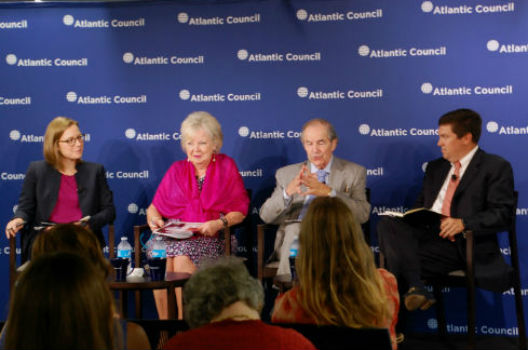
On Friday, July 14, the Atlantic Council’s Sudan Task Force launched its latest report, Sudan: A Strategy for Re-Engagement by Ambassador Mary Carlin Yates with Kelsey Lilley.
See more about the Africa Center
Back to Top
FUTURE EUROPE INITIATIVE
Global Forum
From July 6-7, the Atlantic Council and the Polish Institute of International Affairs hosted the Global Forum in Warsaw, on the occasion of the first visit by US President Donald Trump to Poland en route to the G20 Summit in Hamburg, and in conjunction with the Three Seas Initiative Summit of regional European leaders hosted by Presidents Andrzej Duda of Poland and Kolinda Grabar-Kitarović of Croatia. The forum convened leading transatlantic strategists, business leaders, and journalists against the backdrop of tumultuous global challenges to consider the future of the transatlantic relationship under new leadership.
Private Roundtable on the Future of the Cyprus Negotiations with Ambassador Andreas Mavroyiannis
On July 19, the Atlantic Council hosted Ambassador Mavroyiannis and key stakeholders in the Cyprus negotiations. The Ambassador analyzed why the most recent round of negotiations failed and discussed future opportunities for reconciliation.
DINU PATRICIU EURASIA CENTER
The State of Ukraine’s Energy Sector
On Wednesday, July 12, the Atlantic Council brought together top energy experts and policymakers for a conference on the status of the Ukrainian energy sector. This joint conference, led by the Atlantic Council’s Dinu Patriciu Eurasia Center and Global Energy Center, conference consisted of two panels: Hydrocarbons and Electricity, Coal, and Nuclear. The panelists –Ambassador Richard Morningstar of the Atlantic Council, Steve Nicandros of the Frontera Resources Corporations, David Mohler formerly with the US Department of Energy, Kris Singh of Holtec International, Michèle Small of the European Bank for Reconstruction and development and Vitaly Butenko of DTEK Energy – shared insights on the situation in DC regarding policy towards Ukraine, the critical issues and opportunities facing the Ukrainian energy sector, and the impact of Ukrainian politics on its modernization and growth. Olga Bielkova, member and deputy chairperson of the Committee on Fuel and Energy Complex, Nuclear Policy, and Nuclear Safety of the Verkhovna Rada, joined remotely via Skype to share her insights on the ground. The sessions were moderated by Atlantic Council Senior Fellows, Anders Åslund of the Dinu Patriciu Eurasia Center, and Bud Coote or the Global Energy Center.
Private Roundtable: A Conversation with D. Bruce Wharton, Acting Under Secretary of State
On July 26, the Atlantic Council hosted Acting Under Secretary of State for Public Diplomacy and Public Affairs, D. Bruce Wharton for a discussion on the challenges facing public diplomacy in an age of disinformation. This discussion addressed the consequences of and responses to disinformation efforts – ranging from human trolls to disinformation bots – which can buffet markets, undermine democracy, and compromise national security. Ambassador John Herbst, director of the Dinu Patriciu Eurasia Center at the Atlantic Council, moderated the discussion.
Back to Top
SOUTH ASIA CENTER
Regime Change in Iran: From the 1953 Coup to the Trump Policy Review
On Thursday, July 13, the South Asia Center hosted a discussion that analyzed the ramifications of the coup for the Iranian people and US-Iran relations more generally. Additionally, the panelists collectively evaluated the impact of revived regime change rhetoric among some politicians and advisers seeking to influence the policies of the Trump administration toward Iran and the Middle East at large.
Media Diplomacy: Challenging the Indo Pak Narrative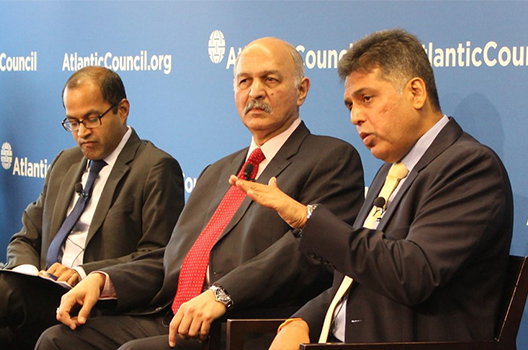
On Monday, July 24, the South Asia Center hosted a discussion on the role of media in fostering relations between India and Pakistan. This discussion outlined how dominant national narratives in India and Pakistan compounded by journalists and social media alike incite further animosity between the two nations, and how this state of affairs can be quelled going forward.
See more about the South Asia Center
Back to Top
GLOBAL BUSINESS & ECONOMICS
Apprenticeship and Manufacturing: Connecting Work and School
On Thursday, July 6, GBE and its sponsors hosted an event in Chicago to discuss the role of apprenticeships in boosting competitiveness and the lessons that US companies can learn from firms in Germany and other EU countries.
Briefing of Senate Staffers on Italian Banking
GBE met with a group of Senate staff members to explain and discuss recent events and current trends in Italian and European financial sector. The event served for the promotion of the EuroGrowth Initiative.
GLOBAL ENERGY CENTER
Russia Sanctions Revisited
On Wednesday, July 19, the Global Energy Center, in partnership with the Dinu Patriciu Eurasia Center, hosted Daniel Yergin, Ambassadors Daniel Fried and Richard Morningstar, along with Jeffrey Turner and David Mortlock for a conversation about the recently Senate-passed legislation on Russia sanctions. The ongoing discussions in Congress provided an opportunity to take stock of existing sanctions policy, discuss the proposed legislative changes, and assess the current and future impact of sanctions on Russia’s energy sector.
Energy Sector Development in Iran
On Wednesday, July 26, the Global Energy Center hosted a private, off-the-record roundtable featuring Senior Fellow Sara Vakhshouri. It focused on the Iranian energy sector and the potential for and status of investment following the nuclear deal, as well as the impact of the Trump Administration’s stance toward Iran and the nuclear deal, continued Congressional pressure with respect to sanctions, domestic political developments in Iran, and changing oil and gas markets.
Millennium Leadership Program
Tipping Points: Finding Energy-Climate Balance
Between Wednesday, June 21 and Thursday, June 22, the Millennium Leadership Program, in partnership with the Ecologic Institute, hosted the 2017 Tipping Points: Finding Energy-Climate Balance conference. Tipping Points gathered the top leaders under forty years old from around the world to discuss one of the most pressing challenges the Millennial generation is inheriting: how to balance mitigating and adapting to climate change with the need for secure and reliable energy to fuel our future. The conference was a bipartisan and cross-generational dialogue about the future, featuring a lineup of senior speakers alongside the young leaders of the Millennium Fellowship Program that represent the full spectrum of views on energy and climate from both sides of the Atlantic in order to make a sustained call-to-action, including former US Secretary of Energy Ernest Moniz, former EPA Administrator Gov. Christie Todd Whitman, Chairman and CEO of the Libra Group George Logothetis, CEO of Meridiam Thierry Deau, and Campaign Director for Greenpeace USA Leila Deen, among many others.
Back to Top
In the News
Atlantic Council experts are in the news regularly. Some examples are below. You can see all of our media mentions here.
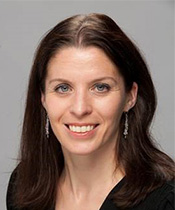 “In the wake of a string of terror attacks, European policymakers are grasping for ways to neutralize terrorist networks and prevent future attacks. As they do so, they are overlooking an important untapped resource: the Continent’s tech startup scene.
“In the wake of a string of terror attacks, European policymakers are grasping for ways to neutralize terrorist networks and prevent future attacks. As they do so, they are overlooking an important untapped resource: the Continent’s tech startup scene.
If Europe is serious about tackling terrorism, it should follow Washington’s example and mine the industry where today’s innovative minds congregate. The CIA is, for example, part-owner of Recorded Future, a Swedish tech firm that scans internet content to predict events, including terror attacks.
That’s just one company the spy agency has invested in via In-Q-Tel, a venture capital firm investing on behalf of US intelligence agencies.”
Elisabeth Braw, Transatlantic Security Initiative Nonresident Senior Fellow, Brent Scowcroft Center- Politico
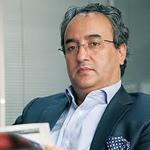 “Africans’ feeling of goodwill toward Trump is an asset this White House should build on. His opponents, meanwhile, can work to ensure that whatever the future of this presidency, as the nations of Africa continue to develop, so does their partnership with the U.S.”
“Africans’ feeling of goodwill toward Trump is an asset this White House should build on. His opponents, meanwhile, can work to ensure that whatever the future of this presidency, as the nations of Africa continue to develop, so does their partnership with the U.S.”
Ahmed Charai, Chairman, Maroc Telematique- The Hill
 “The UK must figure out just what kind of trade relationship it needs with the United States, which will be difficult if it is unable to secure a clear picture of what its trade relationship with Europe will be.”
“The UK must figure out just what kind of trade relationship it needs with the United States, which will be difficult if it is unable to secure a clear picture of what its trade relationship with Europe will be.”
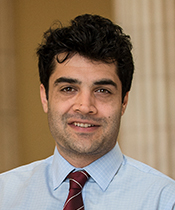 “The U.S has spent far too much money in Afghanistan, but not all of it was wasted. A settlement or grand bargain with the Taliban under current conditions would mean throwing away hard-fought gains.”
“The U.S has spent far too much money in Afghanistan, but not all of it was wasted. A settlement or grand bargain with the Taliban under current conditions would mean throwing away hard-fought gains.”
Javid Ahmad, Nonresident Fellow, South Asia Center- Wall Street Journal
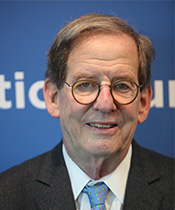 “Punishing Russia where they feel it most — the energy sector — for transgressions in Ukraine and meddling in the U.S. presidential election is wholly appropriate. However, the bill would be more effective in achieving that goal if it did not inadvertently punish the Southern Gas Corridor. It has been demonstrated that scalpel-like precision can be utilized to minimize unintended consequences in crafting legislation — it is critical that the U.S. Congress do so again now. Don’t throw the baby out with the bathwater!”
“Punishing Russia where they feel it most — the energy sector — for transgressions in Ukraine and meddling in the U.S. presidential election is wholly appropriate. However, the bill would be more effective in achieving that goal if it did not inadvertently punish the Southern Gas Corridor. It has been demonstrated that scalpel-like precision can be utilized to minimize unintended consequences in crafting legislation — it is critical that the U.S. Congress do so again now. Don’t throw the baby out with the bathwater!”
Ambassador Richard Morningstar, Founding Director and Chairman, Global Energy Center- The Hill
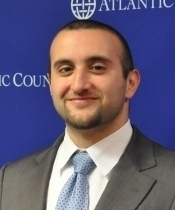 “I think our voice at the table started decreasing when we failed to respond to chemical weapons attacks on August 2013, failed to respond to the Russian entry and the subsequent escalation. I think all the parties really on the other side have already sort of taken measure of us and understood what our commitments are and what they aren’t, and that we don’t have the stomach for a fight against Bashar al-Assad or even the stomach for sort of stopping these sort of atrocities that you’re talking about.”
“I think our voice at the table started decreasing when we failed to respond to chemical weapons attacks on August 2013, failed to respond to the Russian entry and the subsequent escalation. I think all the parties really on the other side have already sort of taken measure of us and understood what our commitments are and what they aren’t, and that we don’t have the stomach for a fight against Bashar al-Assad or even the stomach for sort of stopping these sort of atrocities that you’re talking about.”
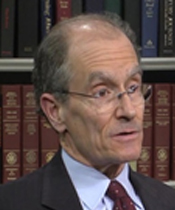 “Any U.S. strategy toward Russia will have an element of resisting Russian aggression, an element of looking for areas of common interest where we can find them – but don’t expect too much – and a third area of looking to the future. That’ll be the policy. The question, though, is not whether we can put together a policy but whether President Trump will actually embrace it.”
“Any U.S. strategy toward Russia will have an element of resisting Russian aggression, an element of looking for areas of common interest where we can find them – but don’t expect too much – and a third area of looking to the future. That’ll be the policy. The question, though, is not whether we can put together a policy but whether President Trump will actually embrace it.”
Dimiter Toshkov, lays bare the difficult structural tradeoffs inherent to the European Union and proposes potential remedies. This publication is part of the EuroGrowtgh Initiative.
Partner Operations in Syria: Lessons Learned and the Way Forward
Aaron Stein
This report is based on a series of interviews with US officials and details two efforts to achieve US objectives to take back territory from ISIS in Syria—with elements trained in Turkey, as part of the Train and Equip program, and through the Syrian Democratic Forces (SDF), the dominant local force in northeastern Syria. The Train and Equip program failed to meet its objectives, while the SDF has been a tactical success. The different outcomes make these two programs worth studying in depth.
Libya: From Intervention to Proxy War
Karim Mezran and Elissa Miller
In this issue brief, Dr. Karim Mezran and Elissa Miller explore the dynamics of regional and international actors most involved in Libya’s proxy conflict, as well as recent incidents of escalation that threaten to further destabilize the country. The authors argue that ultimately, the stabilization of Libya should be the primary goal of any Western engagement.
